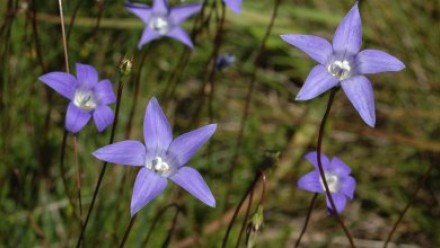Sequencing the genome of an Australian Alpine plant
This project has been awarded and is no longer available
CBA-supported Honours project (2019/20)
Genomic studies of non-model species have great potential to shed light on important ecological processes like phenotypic plasticity in response to changing environmental conditions. However, to date, research on the genetic underpinnings of plasticity has been hindered by a lack of reference genomes for most non-model species.
This project will investigate genome structure in an Australian alpine plant, Wahlenbergia ceracea, that is part of large-scale study into the effects of climate change on wild species.Wahlenbergia ceracea is an Australian endemic species, a short-lived herb that grows in moist sites on high elevations in alpine and sub-alpine environments. The species shows phenotypic plasticity for several physiological and morphological traits and higher epigenetic diversity in response to high temperatures.
The project will use high-throughput sequencing techniques, specifically a combination of short-read sequencing with Illumina and long-read sequencing with Nanopore, to sequence the Wahlenbergia ceracea genome. The student will analyse the genome size of W. ceracea and other Australian species in the Wahlenbergia genus to evaluate the role of genome size and ploidy level in the evolution of the genus in Australia, as well as its role in the adaptation to high- vs. low-elevation environments.
This project has three major aims:
- Evaluate genome size and ploidy levels of different species in the Wahlenbergia genus, and potential differences between high- and low-elevation populations;
- Build a reference genome for W. ceracea including gene annotations;
- Identify genes, gene structures and gene homologs assigned to well-annotated genomes, for example Arabidopsis.
The project will involve lab work, aimed at extracting high quality DNA for sequencing and at estimating genome sizes by means of flow cytometry in CSIRO, but the core of the project will consist of bioinformatics-computational work to assembly and annotate the genome.
The student will be trained for all aspects of the project and will benefit from well-established DNA extraction protocols as well as data analysis. Candidates with prior experience in bioinformatics and command-line interface are especially encouraged to apply.
The successful applicant will be supported by $5,000 stipend for the duration of the course and have the opportunity to work across two world-class research institutions - ANU's Research School of Biology (Divisions of Ecology and Evolution and Plant Sciences), and CSIRO's Australian National Herbarium.
Information on Honours at RSB can be found here. Potential start dates: Sem 2 2019, Sem 1 2020 or Sem 2 2020.
Please get touch with supervisors Benjamin Schwessinger (benjamin.schwessinger@anu.edu.au) or Adrienne Nicotra (adrienne.nicotra@anu.edu.au) if you would like to apply and/or receive more information.
Project collaborators:
- Diep Ganguly (PS, ANU)
- Loeske Kruuk (E&E, ANU)
- Rocco Notarnicola (E&E, ANU)
- Alexander Schmidt-Lebuhn (ANH, CSIRO)





